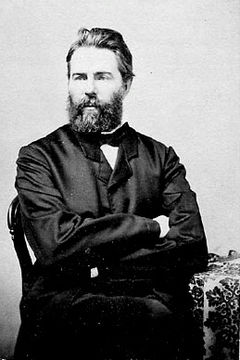Old School Lessons for Digital Age Creatives
By Peter LloydSome things never change but everything changes. Let's churn that conundrum for a while. Age-old rules from the Old School reign today and always will. The dazzling display and blazing speed of digital delivery may trick us into thinking a new wave of technology amounts to something different from the waves that have been beating the shores of our senses from the beginning. But don't be fooled.
New waves of innovation are nothing more than new ways to serve the king, Content. But even the king serves the god, Creativity.
What Stays the Same
 Whether you read it in a leather-bound first-edition or on an iPad, Moby Dick is Moby Dick. Its greatness lies in its content and its content gets greatness from Melville's creativity.
Whether you read it in a leather-bound first-edition or on an iPad, Moby Dick is Moby Dick. Its greatness lies in its content and its content gets greatness from Melville's creativity. A Kindle has no problem preserving the integrity of the book. On the other hand, new media versions, like Moby Dick movies, succeed to the degree that they convey, not the words in the order they march off the pages of the book, but Melville's creativity.
His Old School story still has plenty to teach us about our voracious appetite for un-renewable sources of fuel and the predictable results of that appetite. See "The Ahab Parallax."
Naturally, in order to preserve the creative integrity of a book in new media—stagings, radio plays, TV shows, movies, webcasts, podcasts—even a great work has to change. You'd no sooner shoot a novel word for word than read a print ad as a radio commercial or display it as a television spot. We should welcome this inevitable kind of change as long as it serves the creative content, not just the medium.
Let the medium do what it does best. Strain the creative limits of every new technology. How about an animated, 3-D, interactive Moby Dick re-titled My Moby?
What Changes
Electronic media may never replace the book, but they should replace the dictionary. Lexicon content is not creative at all, which is why the internet has all but blown it away. Every dictionary is out of date today and gets more out of date every minute. Meanings have always changed faster than the dictionary could follow and the gap keeps widening. Only versions like Wictionary and Answers.com can hope to keep up.
Look up the word dictionary on Wordnik. You get the definition, alright, but a whole heck of a lot more. Can your paper-page dictionary do that? Likewise, no map or globe can compete with online maps or Google Earth. It's all over for paper versions of non-creative content, like telephone directories.
Sea Change
Digital presentations don't just make a lot more things happen immediately, they also tap the power of the crowd. As I write, we're crowdsourcing ways to plug the Deepwater Horizon oil spill in the Gulf of Mexico. More than 20-thousand suggestions have reached Deepwater Horizon Response at this point with a hundred or so under consideration.
Nothing new about that. In Not Invented Here, I reported that NASA "encourages the submission of unsolicited proposals to receive unique and innovative research aligned with the agency's mission."
In contrast, look what happens when you limit your idea input to a boardroom of oil executives:
Keep pushing the technological envelope. Forget nostalgia for the musty aroma of your leather-bound Melville. Just don't forget the king and god. We don't want to lament, like the boardroom executives in the New Yorker cartoon, "We have lots of information technology. We just don't have any information."
Peter Lloyd is co-creator with Stephen Grossman of Animal Crackers, the breakthrough problem-solving tool designed to crack your toughest problems.
